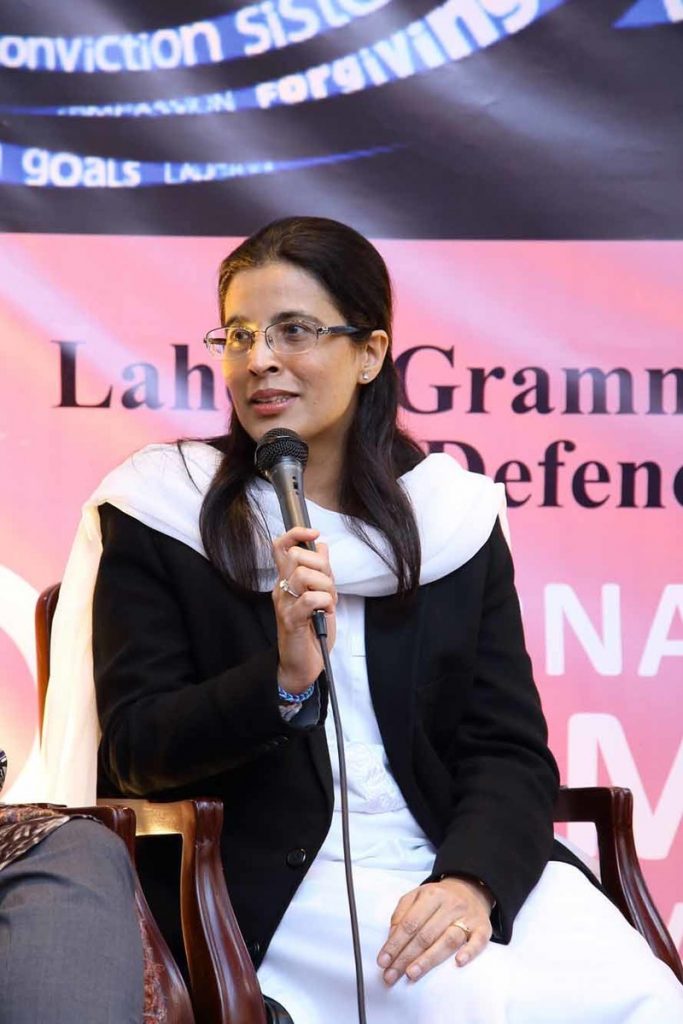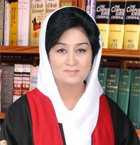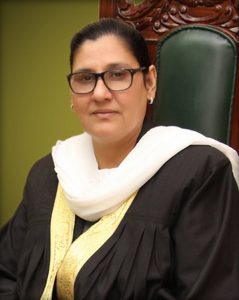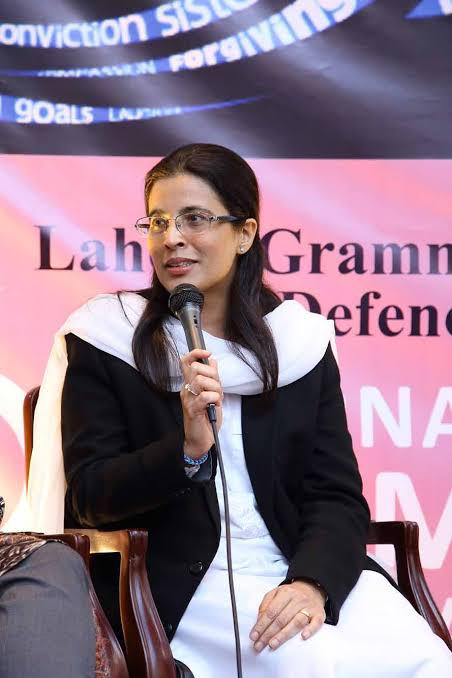6/1/22: Today, the nomination of Justice Ayesha Malik for her appointment as Supreme Court judge has been approved by the Judicial Commission of Pakistan (JCP) with a vote of five to four.
This essentially means that she will become the first female Supreme Court judge in the judicial history of Pakistan.
Justice Ayesha Malik will be the first female Supreme Court in judicial history of Pakistan. https://t.co/5YymIfVWM4
— Hasnaat Malik (@HasnaatMalik) January 6, 2022
Seniority was presented as a reason not to elevate Justice Ayesha by the opposing legal community. She is number four on the Lahore High Court (LHC) judge seniority list, which makes her stand on the spot after three Honourable judges of the LHC.
A statement was issued by the Women in Law Pakistan in regards to the debate about seniority on the appointment of Justice Ayesha Malik of the Lahore High Court (LHC) to the apex court. As per the group, “the argument that seniority is a legal requirement is a myth, and “there is no requirement in law and Constitution to appoint the senior-most judge to the Supreme Court”.”
Who Endorsed Justice Ayesha?
Justice Ayesha Malik’s nomination was endorsed by Chief Justice of Pakistan (CJP) Gulzar Ahmed, Justice Umar Ata Bandial, retired judge Sarmad Jalal Osmani, Attorney General of Pakistan Khalid Jawed Khan, and Law Minister Dr. Farogh Naseem.
Justice Qazi Faez Isa opposed her nomination. https://t.co/5YymIfVWM4
— Hasnaat Malik (@HasnaatMalik) January 6, 2022
However, Justice Qazi Faez Isa opposed her nomination.
In March of 2012, she became the judge of the court. If she gets elevated, she will work as a Supreme Court judge till 2031 and become Chief Justice of Pakistan (CJP) after the retirement of Justice Yahya Afridi in January 2030.
Justice Ayesha Malik to Become Pakistan’s First Woman Supreme Court Judge After 74 years
13/8/21: In Pakistan’s judicial history, the Judicial Commission of Pakistan (JCP) is going to promote a woman judge, Ayesha A. Malik to the Supreme Court on Sept 9.
Justice Ayesha Malik has been working pro bono to counsel for NGOs that work for microfinance, poverty alleviation, and skills training programs in Pakistan. She also served as a reporter for Pakistan for the Oxford Reports, a publication of the Oxford University Press. on the International Law in the Domestic Courts.
Education
Justice Ayesha completed her school in Paris and New York and moved to Karachi to do her senior Cambridge from Karachi Grammar School. In London, she completed her A-Levels from Francis Holland School for Girls. Moving on, in Lahore, she studied at Pakistan College of Law. She then did her LLB from Harvard Law School Cambridge, Massachusetts, USA.
4/6/21: Pakistan is the only country in South Asia without a female judge in the Supreme Court.
According to statistics, the current strength of female judges in the Provincial High Courts including the Capital Territory of Islamabad, Pakistan is less than ten.
The Parliamentary Committee on Judges’ Appointment has taken note of the matter and noticed the gender disproportion in the superior judiciary. The committee has asked the Judicial Commission of Pakistan to help improve the circumstances by nominating females for appointment as judges in the higher judiciary.
Why Pakistan doesn’t have any female judges in the Supreme Court boils down to timing and institutional gender bias. It begins with too few women Judges in the High Courts of Pakistan.
When there is a vacancy in the Supreme Court, a High Court judge is elevated to the Supreme Court. The current strength of the Supreme Court is 17 judges including the Chief Justice. Further, the retirement age of a Supreme Court Judge is 65 years; and 62 years for a High Court Judge. The appointment is based on seniority according to the Judge’s case. There is also a convention to keep the total number of Supreme Court Judges representative by having Sitting Judges from all four Provinces including the Capital Territory of Islamabad in the Supreme Court.
Due to fewer women Judges in the High Courts, Provincial rotation, and the principle of proportionality of Judges across the Provinces sitting in the Supreme Court, the senior-most Judges of the Provincial High Courts who are elevated to the Supreme Court have ended up being only men.
In the past women judges ripe for elevation has retired from the High Court because there was no vacancy in the Supreme Court. These women Judges of the High Courts have been left behind. Of course, this is not the whole story. Both women Judges of the High Court and seasoned senior women advocates can leapfrog the process of appointment of Supreme Court Judges. Both past precedent of appointment of Supreme Court Judges and the Constitution actually support the appointment of women Judges to the Supreme Court of Pakistan to side-step structural institutional discrimination. The point is can the men in Parliament and the Supreme Court be man enough to take the initiative to make the Judiciary at the highest level truly representative?
It is notable to mention that there is no bar on the appointment of women judges in the superior judiciary under the Constitution of Pakistan.
Article 25 states that “All citizens are equal before the law…that there shall be discrimination on the basis of sex.” A report that came out earlier by the Human Rights Commission of Pakistan says “that a mere 5.3% of judges of the country’s high courts are women, the lowest in the region.”
Currently, there are three potential candidates who may be in the running to be eligible to be elevated to the Supreme Court, although time will tell, namely:
1 –Justice Ayesha A. Malik from Lahore, Pakistan

2 – Justice Musarrat Hilali from Peshawar, Pakistan

3 – Honorable Justice Lubna Saleem Pervez from Islamabad High Court, Pakistan

Two Junior Barristers from London Design & Launch Hijabs for Court. read the full story here:
London’s two junior barristers from human rights chambers, Doughty Road, have come together to design and launch a hijab for Muslim women. The two barristers, regulatory lawyer Karlia Lykorgou, and prison advocate Maryam Mir recognized the gap. They felt the need to fill in by making visible efforts to launch the hijab for Muslim women associated with the court.
Two Junior Barristers from London Design & Launch Hijabs for Court
Have something to add? Let us know in the comment section below.
For more news and updates, stay tuned to Wow 360.
